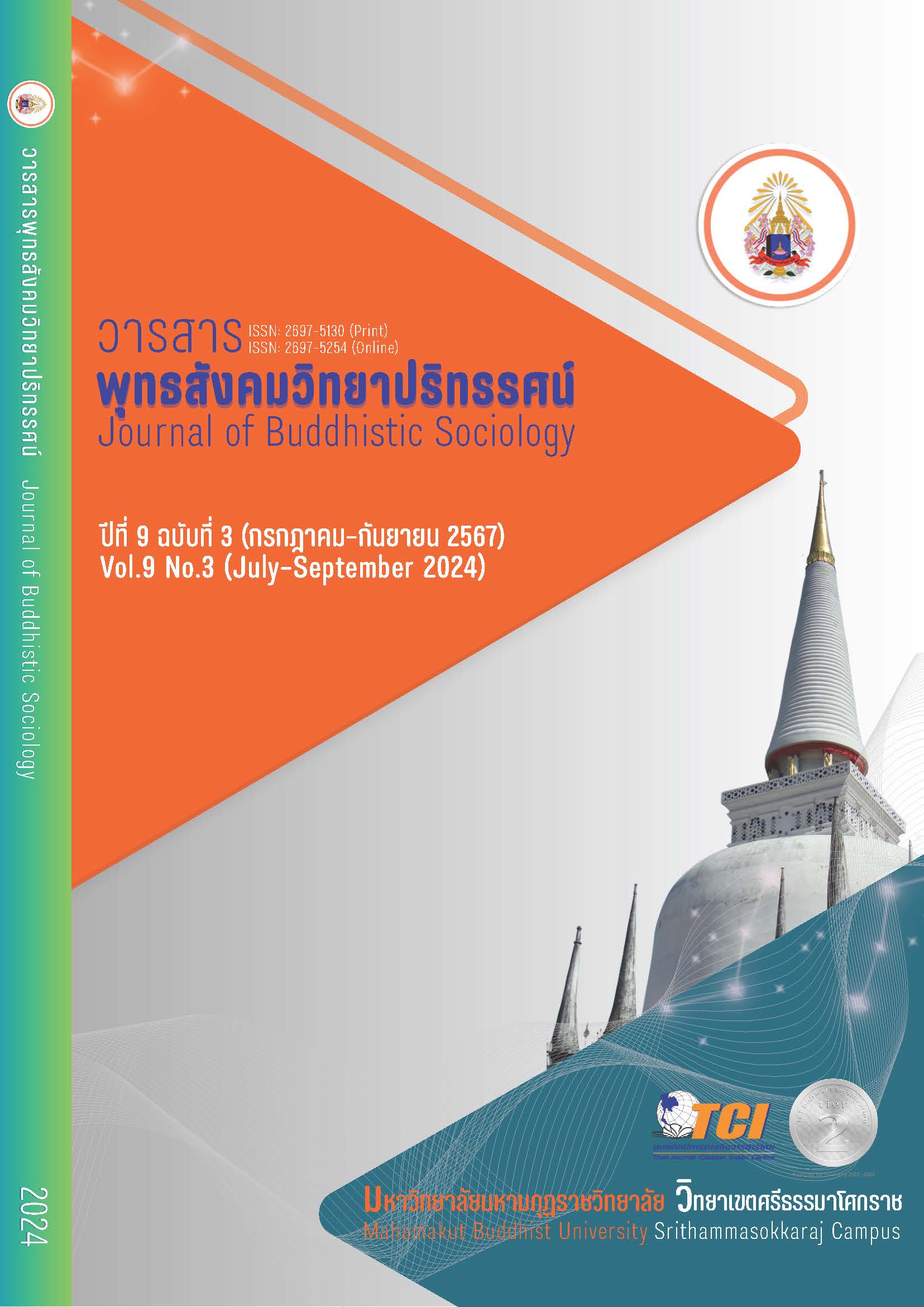BEHAVIORAL LEADERSHIP OF SCHOOL ADMINISTRATORS AFFECTING TEACHERS JOB MOTIVATION UNDER THE OFFICE OF NAKHON SI THAMMARAT PRIMARY EDUCATIONAL SERVICE AREA 4
Main Article Content
Abstract
This research aimed to 1) study the behavioral leadership of educational institution administrators, 2) study the behavioral leadership of school administrators affecting motivation towards performance of teachers under the Office of Nakhon Si Thammarat Primary Educational Service Area 4, and 3) create a prediction equation for behavioral leadership of school administrators affecting motivation towards performance of teachers under the Office of Nakhon Si Thammarat Primary Educational Service Area 4. The sample group used in this research included 313 teachers in educational institutions under the Office of Nakhon Si Thammarat Primary Educational Service Area 4 in the academic year of 2020. The instrument used in the research was a questionnaire. Statistics used for data analysis included frequency, percentage, average score, and standard deviation. The data were analyzed to find the Pearson correlation coefficient.
The research revealed that:
- Behavioral leadership of educational institution administrators under the Office of Nakhon Si Thammarat Primary Educational Service Area 4: Overall, it was at a high level X = 3.99
- Behavioral leadership of school administrators is positively related to the performance motivation of teachers under the Office of Nakhon Si Thammarat Primary Educational Service Area 4. They could jointly forecast the motivation in teachers' work performance at 48 percent with the statistical significance at the .01 level. The behavior was divided into three aspects: Relationship-oriented leadership, Task-oriented leadership, and Moderate-practice leadership.
- The prediction equations for behavioral leadership of school administrators affecting motivation towards the performance of teachers under the Office of Nakhon Si Thammarat Primary Educational Service Area 4 had a multiple correlation coefficient of criterion variables (motivation for teachers' performance) and predictor (X1, X2, X3, X4, and X5) at .69. The prediction power was at 48%. Standard Error of Prediction was at .43. This implies that the school administrators should actively encourage the five behavioral leadership factors that affected the behavioral leadership of school administrators under the Office of Nakhon Si Thammarat Primary Educational Service Area 4. These five behavioral leadership factors included Results-oriented leadership, Team leadership, Relationship-oriented leadership, Moderate leadership, and Laissez-Faire leadership. Moreover, school administrators should systematically, concretely, and continuously apply behavioral leadership for efficiency and effectiveness.
Article Details

This work is licensed under a Creative Commons Attribution-NonCommercial-NoDerivatives 4.0 International License.
References
กระทรวงศึกษาธิการ. (2545). พระราชบัญญัติการศึกษาแห่งชาติ พ.ศ. 2542 และแก้ไขเพิ่มเติม (ฉบับที่ 2) พ.ศ. 2545. กรุงเทพมหานคร: องค์การสินค้าและพัสดุภัณฑ์ (ร.ส.พ.).
จีรานุช มูลประเสริฐ. (2554). ภาวะผู้นำเหนือผู้นำของผู้บริหารสถานศึกษา สังกัดเทศบาลเมืองศรีราชา. ใน งานนิพนธ์การศึกษามหาบัณฑิต. มหาวิทยาลัยบูรพา.
ซาฝีน๊ะ แอหลัง และคณะ. (2561). ภาวะผู้นำเชิงกลยุทธ์ของผู้บริหารสถานศึกษา ตามความคิดเห็นของครูสังกัดสำนักงานเขตพื้นที่การศึกษามัธยมศึกษา เขต 11 ในจังหวัดสุราษฎร์ธานี. ใน วิทยานิพนธ์ครุศาสตรมหาบัณฑิต สาขาวิชาการบริหารการศึกษา. มหาวิทยาลัยราชภัฏสุราษฎร์ธานี.
ณปภัช อำพวลิน. (2557). การศึกษาความสัมพันธ์ระหว่างภาวะผู้นำของผู้บริหารสถานศึกษากับ แรงจูงใจในการทำงานของครู สังกัดสำนักงานเขตพื้นที่การศึกษาประถมศึกษา พิษณุโลก เขต 1. ใน วิทยานิพนธ์ครุศาสตรมหาบัณฑิต สาขาวิชาการบริหารการศึกษา. มหาวิทยาลัยราชภัฏพิบูลสงคราม.
นาวินทิพย์ สิงห์งอย และคณะ. (2564). ความสัมพันธ์ระหว่างภาวะผู้นำเชิงพฤติกรรมของผู้บริหารสถานศึกษากับการจูงใจในการปฏิบัติงานของครู สังกัดสำนักงานเขตพื้นที่การศึกษาประถมศึกษานครพนม เขต 1. ใน วิทยานิพนธ์ครุศาสตรมหาบัณฑิต สาขาวิชาการบริหารการศึกษา. มหาวิทยาลัยราชภัฏสกลนคร.
เนตร์พัณณา ยาวิราช. (2552). ภาวะผู้นำและผู้นำเชิงกลยุทธ์ (พิมพ์ครั้งที่ 7). กรุงเทพมหานคร: ริปเพิ้ล กรุ๊ป.
Krejcie, R. V. & Morgan, D. W. . (1970). Determining Sample Size for Research Scillities. Education and Phychological Measurement, 30(3), 607-610.


